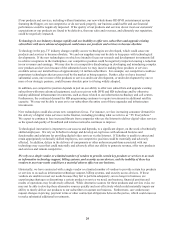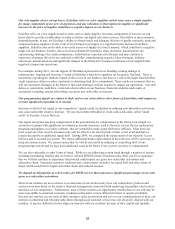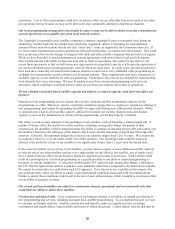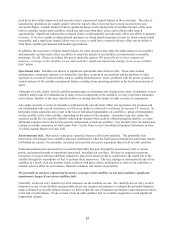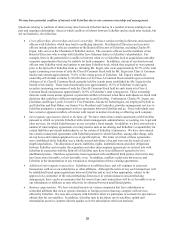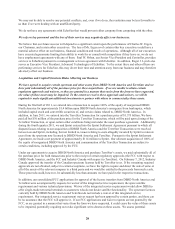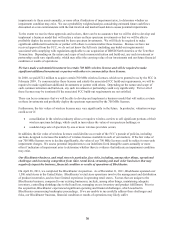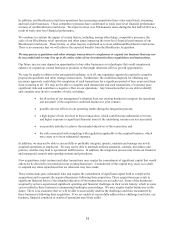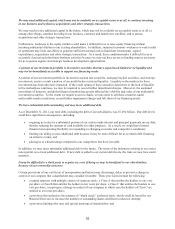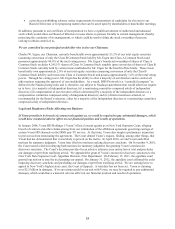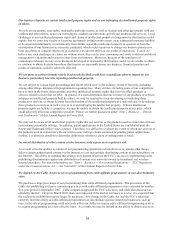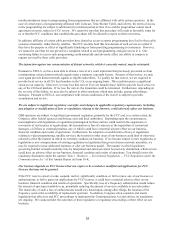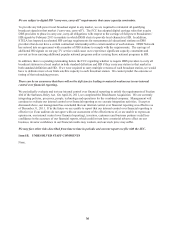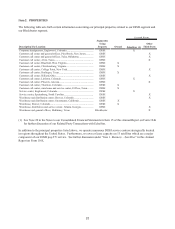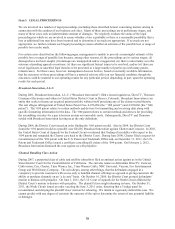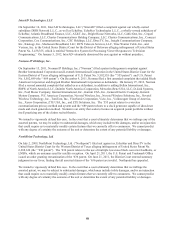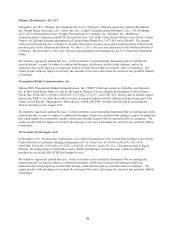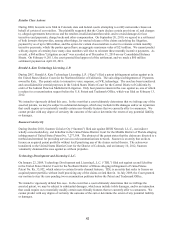Dish Network 2011 Annual Report Download - page 44
Download and view the complete annual report
Please find page 44 of the 2011 Dish Network annual report below. You can navigate through the pages in the report by either clicking on the pages listed below, or by using the keyword search tool below to find specific information within the annual report.
34
34
Our business depends on certain intellectual property rights and on not infringing the intellectual property rights
of others.
We rely on our patents, copyrights, trademarks and trade secrets, as well as licenses and other agreements with our
vendors and other parties, to use our technologies, conduct our operations and sell our products and services. Legal
challenges to our intellectual property rights and claims of intellectual property infringement by third parties could
require that we enter into royalty or licensing agreements on unfavorable terms, incur substantial monetary liability
or be enjoined preliminarily or permanently from further use of the intellectual property in question or from the
continuation of our businesses as currently conducted, which could require us to change our business practices or
limit our ability to compete effectively or could have an adverse effect on our results of operations. Even if we
believe any such challenges or claims are without merit, they can be time-consuming and costly to defend and divert
management’s attention and resources away from our business. Moreover, because of the rapid pace of
technological change, we rely on technologies developed or licensed by third parties, and if we are unable to obtain
or continue to obtain licenses from these third parties on reasonable terms, our business, financial position and
results of operations could be adversely affected.
We are party to various lawsuits which, if adversely decided, could have a significant adverse impact on our
business, particularly lawsuits regarding intellectual property.
We are subject to various legal proceedings and claims which arise in the ordinary course of business, including
among other things, disputes with programmers regarding fees. Many entities, including some of our competitors,
have or may in the future obtain patents and other intellectual property rights that cover or affect products or
services related to those that we offer. In general, if a court determines that one or more of our products or services
infringes on intellectual property held by others, we may be required to cease developing or marketing those
products or services, to obtain licenses from the holders of the intellectual property at a material cost, or to redesign
those products or services in such a way as to avoid infringing the intellectual property. If those intellectual
property rights are held by a competitor, we may be unable to obtain the intellectual property at any price, which
could adversely affect our competitive position. Please see further discussion under “Item 1. Business — Patents
and Trademarks” of this Annual Report on Form 10-K.
We may not be aware of all intellectual property rights that our services or the products used in connection with our
services may potentially infringe. In addition, patent applications in the United States are confidential until the
Patent and Trademark Office issues a patent. Therefore, it is difficult to evaluate the extent to which our services or
the products used in connection with our services may infringe claims contained in pending patent applications.
Further, it is often not possible to determine definitively whether a claim of infringement is valid.
Increased distribution of video content via the Internet could expose us to regulatory risk.
As a result of recent updates to certain of our programming agreements which allow us to, among other things,
deliver certain authenticated content via the Internet, we are increasingly distributing content to our subscribers via
the Internet. The ability to continue this strategy may depend in part on the FCC’s success in implementing rules
prohibiting discrimination against our distribution of content over networks owned by broadband and wireless
Internet providers. For more information, see “Item 1. Business — Government Regulations — FCC Regulation
under the Communications Act — Net Neutrality” of this Annual Report on Form 10-K.
We depend on the Cable Act for access to programming from cable-affiliate programmers at non-discriminatory
rates.
We purchase a large percentage of our programming from cable-affiliated programmers. The provisions of the
Cable Act prohibiting exclusive contracting practices with cable-affiliated programmers were extended for another
five-year period in September 2007. Cable companies appealed the FCC’s decision, and while that decision was
upheld by the D.C. Circuit in March 2010, that court indicated if the market continues to evolve, it is expected that
the exclusivity prohibition may no longer be necessary. Any change in the Cable Act and the FCC’s rules that
currently limit the ability of cable-affiliated programmers to discriminate against competing businesses, such as
ours, in the sale of programming could adversely affect our ability to acquire cable-affiliated programming at all or
to acquire programming on a cost-effective basis. As a result, we may be limited in our ability to obtain access on


